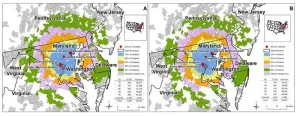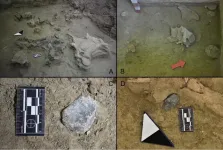(Press-News.org) Location, race and insurance status play a significant part in the odds of a patient being diagnosed with early-stage or late-stage cancer, according to a detailed medical records analysis of more than 94,000 patients with cancer by researchers at the Johns Hopkins Bloomberg School of Public Health and the Johns Hopkins Kimmel Cancer Center.
Patients who lived farther away from a facility designated a comprehensive cancer center (CCC) by the National Cancer Institute (NCI) and who received only a diagnosis or only treatment at the center had higher than average odds of a late-stage diagnosis, as did non-Hispanic Black patients and patients with Medicaid or no insurance, regardless of their location, the researchers report.
The work, published May 2 in JAMA Network Open, highlights that significant barriers to cancer screening and treatment remain to be addressed for people living far from a CCC and for disadvantaged populations.
Previous studies showed that patients who do not receive their first treatment at a CCC experience worse cancer outcomes. Investigators including Michael Desjardins, Ph.D., an assistant research professor of epidemiology and a core faculty member at the Spatial Science for Public Health Center at the Bloomberg School of Public Health; Frank Curriero, Ph.D., professor of epidemiology and director of the Spatial Science for Public Health Center; and William Nelson, M.D., Ph.D., director of the Kimmel Cancer Center, initiated an exploratory study to determine how proximity to a CCC and other social determinants of health affect the odds of receiving a diagnosis of an early-stage or late-stage cancer.
First, the team tackled how to define the region, or “catchment area,” served by a CCC. There is no standardized approach to defining a catchment area among the 54 NCI-designated CCCs nationally. Some centers identify nearby counties with the highest proportion of their patients with cancer, others define areas based on ratio of cancer cases compared to all cancer deaths, and centers use many additional methods. Desjardins, who specializes in geographic information science and health, developed a simple yet intuitive approach to define and evaluate a catchment area: Focus on the closest 75% of patients as determined by miles along the road network using a geographic mean center of Johns Hopkins’ five hospitals.
The team analyzed health and demographic data from 94,007 patients in the Johns Hopkins Hospital cancer registry who received a cancer diagnosis, cancer treatment, or both a diagnosis and treatment from 2010 to 2019. Significant disparities in cancer staging quickly emerged.
Non-Hispanic Black patients had higher odds of receiving a late-stage cancer diagnosis compared to average, even if they lived close to the Kimmel Cancer Center. That finding aligns with a body of work that finds lower odds of cancer survival for non-Hispanic Black patients, and it suggests that accessibility to health care is more complex than geographic distance alone.
Also, people with no insurance, unknown insurance or Medicaid also had higher odds of receiving a late-stage cancer diagnosis. This finding underscores the challenge that people with low income face in accessing health care, especially for cancer treatment.
Finally, patients who lived outside the 75% catchment area and received only treatment or only a diagnosis at a CCC also had higher odds of a late-stage diagnosis. While travel distance could be a factor in seeking only a diagnosis or only treatment, the finding suggests that some CCC patients rely on more than one facility for their cancer care.
“Moving forward, we need to ask patients why they choose a particular cancer center for a diagnosis or a treatment,” says Desjardins. “Maybe they can’t afford the treatment at a certain location, or maybe they are seeking a specific late-stage cancer treatment. There are a lot of nuances we have to try to understand by combining spatial data sets with qualitative surveys.”
“NCI-designated cancer centers are committed to improving cancer care and outcomes throughout their catchment areas, particularly to communities and populations that have been historically underserved,” Nelson adds. “To do so, they will need to work with partners, embracing new technologies and tactics.”
The study authors say diagnosis and treatment ideally should both occur at a CCC, if possible — people diagnosed and treated at a CCC had the lowest odds of a late-stage diagnosis.
Additionally, CCCs across the country can and should adopt a standardized approach to assessing catchment areas, says Desjardins. Then, where areas overlap, centers can communicate with one another to share patient care information.
Additional study co-authors are Norma Kanarek and Jamie Bachman, both of Johns Hopkins.
The research was supported by the Cigarette Restitution Fund of the Maryland Department of Health.
Kanarek receives honoraria from the National Cancer Institute outside the submitted work. Nelson reports receiving grants from the National Cancer Institute outside the submitted work. These relationships are managed by The Johns Hopkins University in accordance with its conflict-of-interest policies.
END
Proximity to a cancer center contributes to cancer stage at diagnosis, study finds
2024-05-22
ELSE PRESS RELEASES FROM THIS DATE:
Study suggests it may be safe to de-escalate surgery in middle-aged breast cancer patients
2024-05-22
Surgery involving sentinel lymph node biopsy for middle-aged women with estrogen receptor-positive (ER+) breast cancer may do more harm than good, according to a new study led by University of Pittsburgh and UPMC Hillman Cancer Center researchers. The team used a novel artificial intelligence pipeline developed by Realyze Intelligence, a UPMC Enterprises portfolio company, to analyze electronic health records.
The findings, published today in JCO Clinical Cancer Informatics, suggest that clinical guidelines for de-escalating surgery in women aged over 70 years with early-stage ER+ breast cancer may be safely ...
Eating more ultra-processed foods tied to cognitive decline, stroke
2024-05-22
MINNEAPOLIS – People who eat more ultra-processed foods like soft drinks, chips and cookies may have a higher risk of having memory and thinking problems and having a stroke than those who eat fewer processed foods, according to a new study published in the May 22, 2024, online issue of Neurology®, the medical journal of the American Academy of Neurology. The study does not prove that eating ultra-processed foods causes memory and thinking problems and stroke. It only shows an association.
Ultra-processed foods are high in added sugar, fat and salt, and low in protein and fiber. They include soft drinks, salty and sugary snacks, ...
What factors predict when older adults will stop driving?
2024-05-22
MINNEAPOLIS – What factors lead older adults to stop driving? A new study followed older adults who had no memory or thinking problems to examine this question. The study is published in the May 22, 2024, online issue of Neurology®, the medical journal of the American Academy of Neurology.
“Alzheimer’s disease develops over a long time—people may have a 10- to 15-year period where they have no symptoms, but the disease process is developing in the brain,” said study author Ganesh M. Babulal, PhD, OTD, of Washington University School of Medicine in St. ...
Subtle cognitive decline precedes end to driving for older adults
2024-05-22
One of the thorniest decisions facing older adults is when to give up their keys and stop driving. A new study by researchers at Washington University School of Medicine in St. Louis could provide guidance in helping seniors plan ahead. The researchers found that impaired cognitive function foreshadows the decision for many seniors to stop driving — more so than age or molecular signs of Alzheimer’s disease. Even very slight cognitive changes are a sign that retirement from driving is imminent. Further, women are more likely to stop driving than ...
Irina Petrache, MD, ATSF, commences term as President of the American Thoracic Society
2024-05-22
May 22, 2024 – Irina Petrache, MD, ATSF, today added president of the American Thoracic Society to her list of accomplishments. The announcement came on the heels of the Plenary Session at the ATS 2024 International Conference. The slate of officers to serve on the Society’s Executive Committee for the 2024-2025 term consists of the following:
Irina Petrache, MD, ATSF, Incoming President
Dr. Petrache is professor of medicine at National Jewish Health and at the University of Colorado. She also serves as chief of Pulmonary, Critical Care and Sleep Medicine, associate ...
Beach erosion will make Southern California coastal living five times more expensive by 2050, USC study predicts
2024-05-22
Contact: Nina Raffio, raffio@usc.edu or (213) 442-8464
Rising sea levels and urban development are accelerating coastal erosion at an alarming rate in Southern California with significant ripple effects on the region’s economy, a USC study reveals.
The study, published in Communications Earth & Environment, predicts that Southern California’s coastal living costs will surge fivefold by 2050 as a direct result of beach erosion. This erosion will require more frequent and costly beach nourishment projects to maintain the state’s treasured shorelines, consequently driving up the cost of living along the coast.
“Our ...
Mount Sinai experts to present new research on long COVID, lung cancer, asthma, sleep apnea, and more at ATS 2024 International Conference
2024-05-22
World renowned pulmonologists and experts in respiratory medicine from the Mount Sinai Health System in New York City will present new research at the American Thoracic Society (ATS) 2024 International Conference in San Diego from May 17–May 22. Please let me know if you would like to coordinate an interview about their work. Mount Sinai doctors and researchers are also available to comment on breaking news and trending topics.
Sessions and Symposiums
(All abstracts listed below are under embargo until the scheduled start ...
Ancient people hunted extinct elephants at Tagua Tagua Lake in Chile 12,000 years ago
2024-05-22
Thousands of years ago, early hunter-gatherers returned regularly to Tagua Tagua Lake in Chile to hunt ancient elephants and take advantage of other local resources, according to a study published May 22, 2024 in the open-access journal PLOS ONE by Rafael Labarca of the Pontifical Catholic University of Chile and colleagues.
Multiple archaeological sites are known from the region of Tagua Tagua Lake in central Chile, representing some of the earliest known human settlements in the Americas. In this study, Labarca and colleagues report ...
Twitter may be overlooking misinformation "superspreaders" - political pundits, low-credibility media outlets, and influencers who use more toxic language than the typical misinformation spreader
2024-05-22
Twitter may be overlooking misinformation "superspreaders" - political pundits, low-credibility media outlets, and influencers who use more toxic language than the typical misinformation spreader
###
Article URL: https://journals.plos.org/plosone/article?id=10.1371/journal.pone.0302201
Article Title: Identifying and characterizing superspreaders of low-credibility content on Twitter
Author Countries: USA, UK
Funding: This work was supported by the John S. and James L. Knight Foundation, Craig Newmark Philanthropies, and the National Science Foundation (grant ACI-1548562). The funders had no role in study design, data ...
Escaped GMO canola plants persist long-term, but may be losing their extra genes
2024-05-22
Populations of canola plants genetically engineered to be resistant to herbicides can survive outside of farms, but may be gradually losing their engineered genes, reports a new study led by Cynthia Sagers of Arizona State University, US, published May 22 in the open-access journal PLOS ONE.
The hypothesis has been put forward that if any genetically engineered crop plants escape farm fields, they will be short-lived. This would make them unlikely to take over wild areas or spread their inserted genes, called transgenes, to wild populations ...






